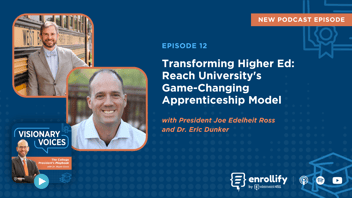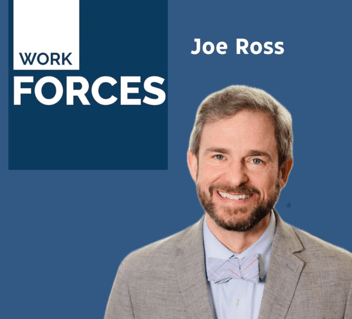The Chronicle of Higher Ed: The Slow Rise of the Apprentice Degree
The promise of the Apprenticeship Degree? “It could be a path to upward mobility for millions.”
In the “The Slow Rise of the Apprentice Degree,” Kelly Field of The Chronicle of Higher Education explores the growing interest in U.S. Apprenticeship Degrees as a transformative solution to challenges in traditional higher education, workforce development, and aligning education-to-career pathways.
 Apprenticeship-based degree programs, pioneered by Reach University and expanding across institutions such as Colorado Mountain College and Bunker Hill Community College, blend paid, on-the-job training with rigorous academic instruction, offering a pathway for individuals who might otherwise be unable to pursue a degree due to financial, personal, and/or geographic constraints.
Apprenticeship-based degree programs, pioneered by Reach University and expanding across institutions such as Colorado Mountain College and Bunker Hill Community College, blend paid, on-the-job training with rigorous academic instruction, offering a pathway for individuals who might otherwise be unable to pursue a degree due to financial, personal, and/or geographic constraints.
While Apprenticeship Degrees are well-established in parts of Europe, their U.S. adoption is still emerging, with education and healthcare serving as the primary sectors of implementation.
A compelling example highlighted in the article is the partnership between Reach University and Albertville City Schools in Alabama. Albertville City is one of Reach’s 460 employer partners across its states of operation.
This partnership enables bilingual school employees, such as teacher’s aides, receptionists, and bus drivers, to work toward a debt-free bachelor’s degree and teaching credential while maintaining their current jobs and income. One aspiring teacher and Reach undergraduate, Ivan Gallardo, draws from his own experiences as an English learner to support students facing similar challenges.
Together, Reach’s Apprenticeship Degree is not only addressing the district's specialized teacher shortage but is also lifting local community members to advance their careers without accruing debt or leaving their home community.
“…Albertville’s assistant superintendent Todd Watkins has one predication: ‘The establishment is not going to like it. Reach is pushing a lot of boundaries,’ he said.”
Although Apprenticeship Degrees are positioned to address higher ed’s longest-standing challenges, the article notes several obstacles to their widespread adoption, including inconsistent funding and regulatory challenges.
“Once this administration is finished tearing things down, it’s going to start building things up,” predicted Ryan Craig. “And I think apprenticeship is one of the things they’re going to get behind.”
The success of partnerships between Reach University and Albertville City demonstrates the potential of Apprenticeship Degrees to create more inclusive and effective pathways to higher education and career advancement.
“Recognizing job training for academic credit requires ‘an important adjustment to the way colleges think about learning,’ said John Colborn, executive director of Apprenticeships for America, ‘which is to say that it doesn’t all happen in the classroom.’”


%20(1200%20x%20628%20px)%20(3).png?width=352&name=APPRENTICESHIP%202.0%20(LinkedIn%20Post)%20(1200%20x%20628%20px)%20(3).png)
